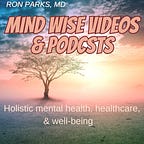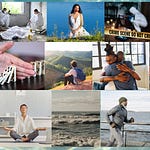Welcome to the Mind Wise podcast, presenting perspective and information about mental health, holistic health care, wellness, neuroscience, psychiatry, philosophy, and spirituality. I am your host, Ron Parks, M.P.H., M.D., writer, teacher, and consultant.
Today I continue to explore the life and journey of unique holistic healthcare enthusiasts and practitioners, their innovative services, and their tips on what they feel works best for themselves and others seeking better health and well-being. My guest today is Corey Costanzo, the co-owner and developer of the unique Still Point Wellness Spa in Asheville, North Carolina. But I'll let Corey tell you who he is, and he will tell us a little about himself, how he got started on his journey, and how he ended up with one of the most beautifully designed and outstanding holistic spas in the country, Still Point Wellness. It is a place to see, experience, and a healthy destination here in Asheville, North Carolina.
Ron: Hi, Cory!
Cory: Hey, Dr. Parks. Thanks so much for asking and being curious about me, my life, business, choices, and all that good stuff. I'm happy to share.
Ron: So, tell us about who you are and your incredible journey.
Cory: All right. So first off. I am a dad of an 18-year-old and a 14-year-old. Two incredible, incredible young women. One of which is about to go off to NYU to study drama next week. So, I am a mixed-emotional dad. Bittersweet. In love with my daughter. So happy that she's just, you know, breaking free.
Follow her dreams in her heart, and nothing's stopping her, and I'm going to miss her like crazy. So yeah, this is a very exciting time in my life.
I grew up in Brooklyn, New York. My whole family is in New York City. So, all of us are just so excited for her. So, yeah. Lots were going on for me with the transition, with my daughter about to leave home.
Professionally, I spend most of my time in full-time private practice working with trauma and addiction using somatic experiencing, Peter Levine's trauma release, and the business, Still Point Wellness that my wife and I co-own.
We have a 9, 000 square foot wellness spa with four float tanks** and a full staff of Esalen massage therapists. We also do physical therapy and coaching. Craniosacral therapy. And we have a far infrared sauna and an incredible integration room for people to really hit those deep places of relaxation and integrate the mind-body experiences they're having through touch and with the float tank and all of our other services.
Yeah. So that's, that's pretty much what I do. I love my work. I'm extremely passionate about it. And I work with adolescents, teenagers, adults, couples, individuals, and families. I'm also constantly doing my own work, which I think really lends itself to constantly learning and growing.
Once, sometimes two or three times a week, I'm in my own type of therapy experience with my counselor or with one of my kids' counselors, or in couples counseling as a client. And for me, it's a long life, lifelong process of discovery that just keeps getting better and better and better. Not easier, but better.
Ron: Corey, if you want to share what comes up for you, what were some early life experiences that got you on your journey to learning and discovery? And I understand that you were at Esalen.
Cory: Yeah, that's right, yeah. So, I, my gosh, I could spend days talking about this, and I'll spare everybody that.
And I'll try to sum it up by saying that a little bit of my journey was after college in Burlington, Vermont. Manhattan became my playground and work ground. And I worked for a startup company called Delia's that wound up going from 10. I was maybe the number 10 employee or so to 500 employees within five years.
And I rode that wave, and this was 1995 to 2000, and wound up being in human resources and call center management and doing a lot of work and, getting basically out of college, getting paid peanuts to pack boxes for this, for this IPO company that wound up after five years, I got a lot of stock options, and the company was sold, went public and cashed out.
And made a lot of money very fast for someone in my mid-twenties and was basically just spending a lot of money and realized the more money I made, the more money I spent, and it was, and it was unsustainable. So, I started looking at other possibilities of what to do instead of just trying to make money.
My heart led me to bodywork and helping people, which led to travel. So, I bought an apartment in Manhattan and then rented it out and used the money that I was making renting out the apartment after paying the mortgage and traveling around the world for a few years, learning different systems of bodywork, and having all sorts of great experiences.
My main teacher, my main place that I would do a deep dive into something in the healing arts, basically wound up at the Esalen Institute in Big Sur, California, which is this incredible place where teachers from all over the world come to Esalen to bring their gifts. I was there for five years, met my wife, had a kid, went to graduate school, and found somatic psychology and my love of that. And yeah, that's it in a nutshell right there.
So Big Sur, California, although an amazing, powerful place, is a very hard place actually to live and grow a family. So, we had our first daughter and lived there for about four years. And we realized we really needed to buy a home and, you know, wanted to lay down some roots. So, we found Asheville and moved to Asheville after being evacuated.
So, we were not really taking the leap, although we wanted to, out of Big Sur. And there were these fires every few years. Big Sur is always on fire every few years. And it's a very hot place. And I mean, it's a very wet and beautiful place as well, but every few years, it just seems that nature has its way with it. It winds up getting evacuated in one way, shape, or form, if not road closure because of mudslides and landslides, because it's too wet, it's too, you know, it could be very easily too dry, and fires pushed us out for a month. We moved to Topanga Canyon and had full-body work practices that developed during that month. And we were just thinking, wow, if we could do this so effortlessly and so quickly in LA, let's look elsewhere. And these mountains in Western North Carolina are just tremendous.
Powerful and beautiful, and they attract a lot of people. They attract people that want to get close to nature and to experience different mindsets and be kind to their bodies and healing, and you know, so there is a lot, there's a lot of consciousness in these mountains around the power of bodywork massage.
Ron: Corey, are there any things that come to mind to share?
Cory: Yeah, I am a big fan of the self-inquiry process. And whatever it takes to get curious about your life. Take a bird's eye view and figure out what you need to do to stop Responding to things that don't go wrong or to ailments to injuries to illnesses To, mental health struggles, whatever it is, you know, taking a bird's eye view and getting curious about, you know, about what led to that and what's out there that can possibly help. I love somatic experiencing and psychotherapy as a client because, for me, that is such an incredible way to take a look and observe my life and notice what's working and what's not working and figure it out.
You know, what needs to shift and what needs to change, what patterns keep repeating themselves that have some underlying forces that keep them locked in. I like to think of psychotherapy as the bridge way to the, to the subconscious too, that really runs the show in my life, and you know, how can I move out of a place of suffering, and so for me, the therapeutic process, psychotherapy, and counseling really has been tremendous.
And I think everyone's got their own thing. You know, there are workbooks out there that people can be self-directed to use the self in the self-inquiry process to better their lives. There are so many different, great modalities out there and practitioners and people, and I would encourage people to follow their hearts, notice what they're drawn to, and then have the courage to try new things.
Ron: Thank you, Corey.
Tips and Points to Ponder:
1. Be always mindful and aware of options you may have for improving your emotional, mental, physical, and spiritual wellness and well-being. You may consider finding a time-out, even if only momentary, in a healing setting or with a healing state of mind.
2. Read my 2016 article about flotation, my floatation experience, and about Cory Costanzo and Still Point Wellness: https://www.inmindwise.com/p/saltwater-flotation-tank-experience
3. ** Further comment by Cory on the float tanks Still Point uses: They have the latest technology and are by Float Lab Technologies. They are the only float manufacturer right now that are fully NSF certified through the National Safety Foundation for their entire float tank. And the process took over ten years and lots of money to gain that certification. You can stand up in them; they're about 7 feet tall. And then when you lay down, there's no light, no sound. It's about skin temperature, water, so it's warm. And you just float effortlessly. At the national level, the health department at the national level has drafted a federal guide, federal guidelines, and best practices for float tanks. It's called the model aquatic health code based on research done certifying float lab tanks. So basically, we use ozone gas and UV light to purify the tanks, which is the best sanitation method. And really, the only sanitation method that the EPA allows for float tanks. And that, again, was based on studies that the NSF did with our float tank manufacturer. We have four of these float lab tanks, and they are, so there's about 12 inches of saltwater solution in them.
Dr. Parks offers sessions for help in gaining clarity and perspective. If interested, click here.
I appreciate your interest. Please share with others. Subscribe to my Substack newsletter and podcast at www.inmindwise.com. All content in this podcast is created and published for educational purposes only, is not intended to be a substitute for professional medical advice, and should not be relied on for medical decisions. Always seek your healthcare provider's guidance regarding medical or mental health conditions. Thank you.











